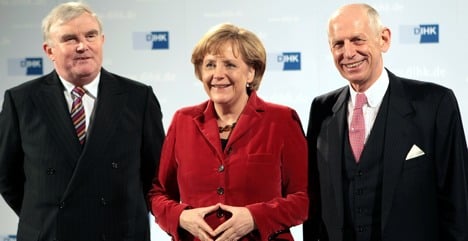President of the German Confederation of Skilled Crafts (ZDH) Otto Kentzler expressed his approval of Chancellor Angela Merkel’s plan to cut taxes in the hope of stimulating economic growth.
Kentzler told news agency DDP on Saturday that he considered the proposed tax relief necessary to recover from this year’s economic downturn. But he did criticise the plan to reduce sales tax for hotel stays from 19 percent to 7 percent.
Hans Heinrich Driftmann, president of the German Chamber of Industry and Commerce, was similarly approving of the tax cuts contained in the Growth Acceleration Law, which only passed through the upper house of German parliament this month after considerable political wrangling.
“The Growth Acceleration Law removes a few very damaging elements of the business and inheritance tax reforms,” Driftmann said. “But the government should also address the problems of tax simplification and income tax rates.”
Mario Ohoven, president of the German Association for Small and Medium-sized Businesses (BVMW) pointed out that the new ruling coalition was obliged to follow up on its election campaign tax-cut promises. “That is why this coalition was elected,” he said. “If they tried to renege now, Angela Merkel and Vice-Chancellor Guido Westerwelle would destroy the faith the voters have in them.”
But even Ohoven had nothing but scorn for the cut in sales tax for hotels. “All the proportions are wrong,” he said of the idea.
Kentzler also said that such “isolated measures” would only lead to further problems of definition. Instead, Kentzler said it would have been better to install “fundamentally new yardsticks for the use of sales tax for goods and services.”
Meanwhile Driftmann gave a critical assessment of the new government’s work so far. “They seem to be losing momentum,” he said. “The politicians are getting bogged down in details instead of discussing the guiding principles of tax policy.”
He said that sales tax had dominated discussion on the Wachstumsbeschleunigungsgesetz, or the new law set to spur economic growth, even though it contained some important reforms that had been ignored.



 Please whitelist us to continue reading.
Please whitelist us to continue reading.
Member comments